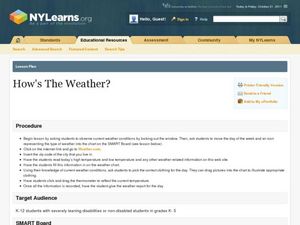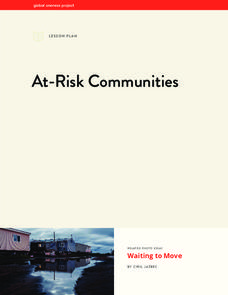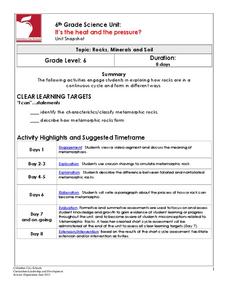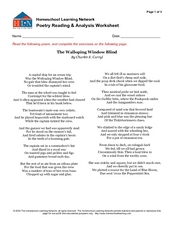Curated OER
The Effects of Storms
An excellent way to review a chapter or unit on storms, this worksheet features vocabulary review (gust, evacuation, storm surge, salinity), concept review (effects and details about hurricanes), skills/process review (normal high tide...
Curated OER
Becoming a Meteorologist
Students identify the job of a meteorologist. In this meteorologist lesson plan, students read Cloudy with a Chance of Meatballs and view clips of weather forecasts. Students visit the Weather Channel website and sing a weather song....
Curated OER
How Do Weather Conditions and Lunar Cycles Affect Fishing Success?
Pupils use weather measuring devices to record and study weather conditions at different locations, during different times. They attempt to draw conclusions about the relationship between weather conditions, lunar cycle and fishing success.
Curated OER
How's the Weather
Students explore weather patterns. They collect and record all aspects of the weather from various sites. Students investigate regional weather and use a spreadsheet to record and chart data. Students chart temperature, humidity,...
Curated OER
Review: Basic Spanish Phrases
Wow, what a review packet! Through several exercises, beginning Spanish language learners will review Spanish phrases, questions, and responses. Common expressions, numbers, and weather are all touched on here. If your class just...
Curated OER
Will There Be a White Christmas This Year?
Students examine historical weather data, and create map and color key that illustrates the likelihood of a white Christmas in different locations across the United States.
Teach Engineering
Global Climate Change
The greenhouse effect and its relationship to global warming is the focus of an activity that asks class member to consider the effects of climate change on weather. Pupils work with their families to determine their carbon footprints...
NASA
Geographical Influences
"If global warming is real, why is it so cold?" Distinguishing the difference between weather and climate is important when it comes to understanding our planet. In these activities, young scientists look at the climate patterns in a...
Macmillan Education
Comparative Adjectives
How can you show that an item is colder than something else? Or that it is more beautiful? Use a worksheet to reinforce the concept of comparative adjectives. With fill-in-the-blanks, word banks, and multiple choice questions, the...
Global Oneness Project
At-Risk Communities
"Waiting to Move," a photo essay by Ciril Jazbec, brings into sharp focus the threats posed by climate change. Class members examine images of Shishmaref Island and the Native Alaskan Inupiate coastal villages that are impacted by rising...
Teach Engineering
Catching the Perfect SAR Waves!
Zero in on an interesting resource involving radar technology. Groups construct a radar sensing unit and learn to calibrate the system. Using the radar system and the Pythagorean Theorem, they calculate distances between objects.
Teach Engineering
Pointing at Maximum Power for PV
Following detailed directions, teams collect the voltage and current outputs of a photovoltaic cell by adjusting the resistance. Using the collected data, they determine the highest power output. Implications for weather and a large...
Columbus City Schools
It's the Heat and the Pressure?
Ready for a change? Give a comprehensive collection of metamorphic materials a try! With the assortment of printables and lab activities, you won't be under pressure to keep things lively. The unit culminates by having pupils complete an...
Media Smarts
Teaching TV: Television Techniques
As part of a five-lesson unit on how television uses technology and film techniques to communicate meaning, elementary students create their own media productions that demonstrate their understanding of these concepts.
Curated OER
Temperature Conversions
Your young weather buffs use compositions and inverses of functions to convert between Celsius, Fahrenheit, and Kelvin degrees. Then they analyze possible compositions and whether they exist in the real-life context.
Curated OER
Internet Fact Hunt at the "Fact Monster" Web Site- April #4
In this Internet fact hunt activity, students access the "Fact Monster" web site to answer 5 multiple choice questions. They answer science, weather, sports, and invention questions.
Curated OER
Poetry Reading: Analysis Worksheet
Explore poetry by reading the poem "The Walloping Window Blind" by Charles E. Carryl, and completing an analysis with your class. The worksheet provides the entire poem, a graphic organizer to help with summarizing and paraphrasing, and...
Curated OER
Comparing and Ordering Decimals
Which decimal is greater? Learners start by comparing eight pairs of decimals, writing in the symbol (> or <) to indicate values. The next two sections involve sets of three decimals. They start by circling the decimal with the...
Curated OER
Where Is That Place?
Students determine the difference between a country, state, and a city while recording the weather conditions for their school in Nebraska. They examine weather for another school in the state while practicing using weather equipment to...
Curated OER
Winds of Destruction
Fourth graders discuss the problems that have arisen from the lastest string of hurricanes and tsuanamis. They watch a video about severe weather. After the film, 4th graders write four facts they found out about severe weather. ...
Curated OER
Aspects of Weather
Students recognize and observe weather phenomena. In this four part weather lesson, students are introduced to weather symbols through a story, then use a thermometer to measure water temperature. Next, students observe the formation of...
Curated OER
Weather Chart
Students select at least 6 cities from around the world to keep track of their high and low temperatures over a period of time.
Curated OER
Explore: 4th Grade Beaufort Wind Speed
Fourth graders measure wind speed, air pressure, humidity, temperature, and wind direction. They compare their observations with those of actual weather forecasts.
Curated OER
Weather Journal
Sixth graders write in a journal using weather observations as the focus, they develop writing techniques in addition to scientific observation skills.

























